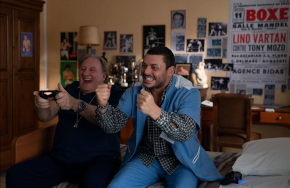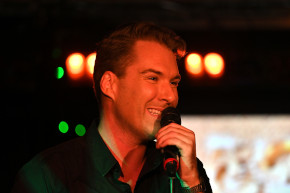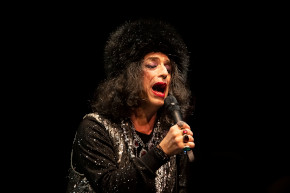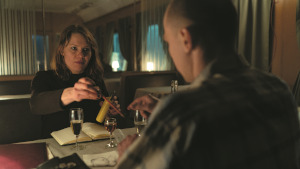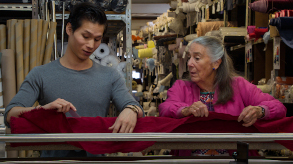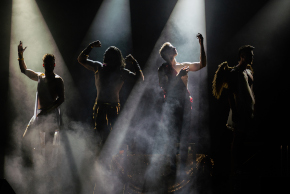The Villa - Maison de retraite - at Luna
- Details
- Written by: Nita Teoh
“...inside every old person is a young person wondering what happened.” - Terry Pratchett, Moving Pictures.
Milann Rousseau (Kev Adams) is a twenty-something orphan who can't get his life together. Aimless, behind in his rent, owing money to loan sharks, and unable to hold down a job, he is dependent on his best friend for a place to stay.
Milann's life takes a steep downward turn after a temper tantrum in his latest short-lived job, when he is sentenced to 300 hours of community service in a retirement village for injuring a senior citizen. He is only allowed three warnings for workplace infractions before being sent to prison instead. Can the self-centred and irresponsible man-child survive 3 months of his worst nightmare, being a dogsbody for old people?
Worse still, the residents at the retirement home don't take to Milann and his bad attitude, and their secret committee decides to teach him a lesson or two. The home's director (Antoine Duléry) and head of security (Ludovic Berthillot) don't like him either, and only want him there for the government funding. And the loan shark wants his money back now, resulting in Milann being kicked out of his wrecked apartment by his fed up friend (Oussama Kheddam).
At rock bottom in life, Milann is forced to take desperate measures to survive.
Peter Cumins at the Perth International Cabaret Festival
- Details
- Written by: Nita Teoh
My partner and I were looking forward to our Friday evening at the Perth International Cabaret Festival – this time we were seeing performer Peter Cumins in his show “There is Nothin’ Like A Dame” at Downstairs at The Maj.
Downstairs at The Maj is a lovely downstairs den – perfect for cabaret shows – with drinks and a light menu available, and small clusters of tables all with a good view of the stage with a nice, cosy, intimate atmosphere.
Peter Cumins' on-stage presence is second to none across multiple fronts. His singing voice leaves you mesmerised and gives you that wonderful feeling of having touched your heart and soul, along with having a very fun and engaging persona between numbers.
This evening we were in for a treat as Peter had selected songs made famous by the dames of musical theatre in Broadway and the West End over the last few decades, including Ethel Merman, Patti LuPone, Julie Andrews, Gwen Verdon, and Judi Dench.
Up Close & Personal - Paul Capsis at Perth Intl Cabaret Fest
- Details
- Written by: Nita Teoh
Sitting around cosy tables on the boards of His Majesty’s with a handy pop up bar behind us, my better half and I eagerly waited for the show to begin, and our eyes were drawn upwards to the domed ceiling admiring the pretty decor of this over 100 year historical building.
Paul Capsis - the “one and only” cabaret queen returns to Perth after 10 years with two special performances at the Perth International Cabaret Festival.
Stepping on stage dressed to the hilt with his foxy purple fur number – glittering sequenced silvery pants and all – we knew we were in for a special night.
With renditions spanning a myriad of famous music artists of the likes of Janice Joplin, the Beatles, Nina Simone, Lou Reed - Capsis’s versatility and vibrancy is a unique one with his strong soulful blues voice which is second to none.
What stood out for myself in being lucky enough to enjoy this memorable evening and special performance is that Capsis gives it his all on stage – he is a musical dynamo!
Compartment No. 6 at Perth Festival
- Details
- Written by: Nita Teoh
“Two strangers share a journey through Russia that changes their perspective on life”
The storyline of Perth Festival’s latest movie offering Compartment No. 6 greatly appealed and with our Charlies Pizza order locked in for the evening (which has become something of a tasty tradition!), my partner and I headed to UWA Somerville, along with temporary third family member Greg the Ambassador Dog for Guide Dogs WA.
The plot of Compartment No. 6 revolves around the main character Laura (acted by Seidi Haarla) - a Finnish archaelogy student studying in Russia, who decides to travel via train to Murmansk with her Russian girlfriend to see the petroglyphs (rock paintings). At the last minute her girlfriend has to cancel due to work, and Laura decides to travel on her own.
As the train heads to the Arctic Circle, Laura is forced to share a cramped sleeper compartment with a travelling companion from hell...
A Stitch in Time at Luna
- Details
- Written by: Greg Letts
Now and again you get a movie that looks just OK in the trailer, but turns out to be so much better when viewed in full. A Stitch in Time by Writer and Director Sasha Hadden is one such movie.
A Stitch in Time doesn't have lots of flashy clips that make for a great two minute trailer, but what it does have is a touching story filled with authentic characters, told exceptionally well.
The story revolves around Liebe (Maggie Blinco), an elderly housewife whose partner Duncan (Glenn Shorrock of Little River Band fame) loses his job singing at the RSL. Duncan is a self-centered and arrogant man, bitter about his lack of success and blaming other people for his failure to find an audience for his music.
In an attempt to raise money to finally record an album, Duncan reconnects with Justin, his old band-mate, and Christine, Justin's wife...
Godz by Head First Acrobats at Fringe World Perth
- Details
- Written by: Nita Teoh
With the glow of the signature Fringe World pink bunny acting as a siren's call, my partner and I eagerly headed to the Girls School to watch the latest show Godz by Head First Acrobats.
The theme for the evening was Ancient Greece as the Gods: Cupid (God of Love), Hercules (God of Strength), Dionysus (God of Wine) and Apollo (God of the Sun, Music and Poetry) graced us with their presence.
The Head First Acrobats cast certainly looked the part of Gods – they are very athletic and fit! Add in their gymnastic mastery, their slapstick humour, and a large dash of naughty sex appeal – these guys are a winning team.
Page 14 of 99
